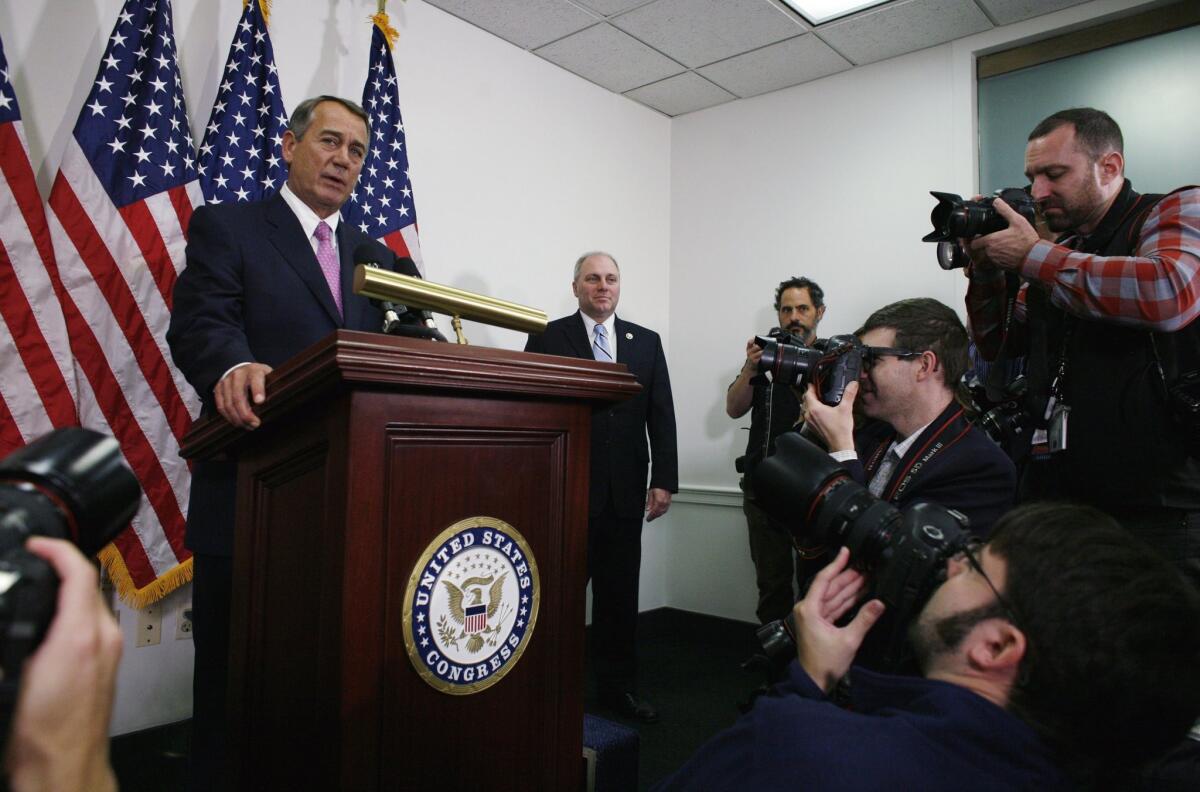Editorial: John Boehner’s last deal leaves Congress better off

Outgoing House Speaker John Boehner of Ohio talks with reporters on Capitol Hill on Oct. 27.
- Share via
In a parting gift to the conservatives who hectored him out of office, House Speaker John A. Boehner (R-Ohio) negotiated a budget agreement with Senate leaders and the Obama administration that increases federal spending and raises the debt ceiling in exchange for — well, not much that Republicans covet. There are no big changes in entitlements, no defunding of Planned Parenthood. Yet this backroom deal delivers the goods that matter most: It will avert the risk of a shutdown until after the next president takes office, providing a welcome measure of stability at a time of increasing anxiety about the global economy.
Boehner had said he wanted to “clean the barn” for his replacement — most likely Rep. Paul D. Ryan (R-Wis.) — which meant disposing of four divisive issues with rapidly approaching deadlines. The federal government is days away from hitting its borrowing limit. Federal agencies are slated to run out of funding in early December. The Social Security trust fund for disability benefits is expected to be empty by late 2016. And millions of elderly and disabled Americans face a whopping 52% increase in their Medicare Part B premiums at year’s end.
The compromise negotiated by congressional leaders and the White House would resolve all of these issues in the time-honored way: giving everyone much of what they want, then paying for it with budget gimmicks. The debt ceiling would be suspended until March 2017, the budget caps lifted for two fiscal years, disability benefits assured through 2022 and Medicare premium increases made less dramatic. Without these steps, Congress risks defaulting on debts, forcing a government shutdown and delivering a painful financial blow to vulnerable Americans. None of those outcomes should even be contemplatable, and yet Congress’ record of dysfunction over the last four years makes them all real possibilities absent a deal like the one Boehner negotiated.
Obviously, it would be better for Congress to make real choices about spending instead of relying on accounting legerdemain to make the numbers look good. The proposed fix for disability insurance, for example, would take the money out of a fund for future retirement benefits; that’s a reprieve, not a solution. But when Congress ignores a problem until the last minute, it takes real solutions off the table, leaving lawmakers to choose between pragmatism and the sort of posturing that dissident House Republicans have made their stock in trade. Credit Boehner with opting for one last deal rather than showing the country again that the House GOP’s reach exceeds its grasp.
Follow the Opinion section on Twitter @latimesopinion and Facebook
More to Read
A cure for the common opinion
Get thought-provoking perspectives with our weekly newsletter.
You may occasionally receive promotional content from the Los Angeles Times.










